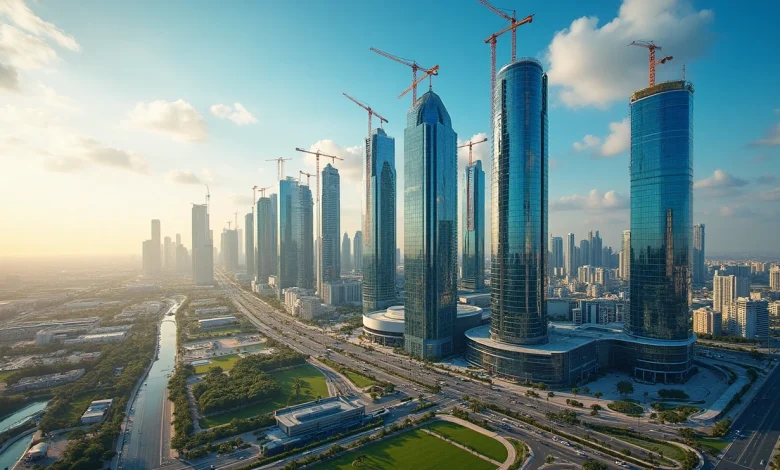
Abu Dhabi’s Non-Oil Economy Grows 6.1%, GDP Reaches $79.2bn
Abu Dhabi’s GDP reached $79.2bn in Q1 2025 while its non-oil economy grew 6.1%, marking a historic alteration in the emirate’s economic map. Non-oil activities now dominate Abu Dhabi’s economy with a 56.2% share of total GDP, and the oil sector accounts for 43.8%. This milestone highlights the remarkable changes within one of the Middle East’s largest economies.
The emirate’s economy expanded 3.4% year-on-year in the first quarter and reached Dh291 billion ($79.2 billion). Abu Dhabi’s diversification strategy has proven successful, with manufacturing, construction, finance, and trade becoming primary catalysts for economic growth. The Statistics Center-Abu Dhabi reports that the non-oil sector grew to Dh163.6 billion, which represents its highest first-quarter share on record [-5].
Abu Dhabi Records 6.1% Non-Oil Growth in 2025
Image Source: Kanebridge News Middle East
“For the first time ever in a Q1 period, non-oil sectors contributed 56.2 per cent of total GDP, underscoring Abu Dhabi’s continued economic diversification efforts.” — Arabian Business Editorial, Arabian Business, leading Middle East business news publication
The Statistics Center–Abu Dhabi (SCAD) released detailed data that shows the emirate’s non-oil sector grew by 6.1% year-on-year in Q1 2025, reaching AED 163.6 billion. Non-oil activities now make up 56.2% of Abu Dhabi’s total economic output. This marks the first time this sector has taken the majority share during a first-quarter period.
Abu Dhabi’s economy expanded by 3.4% compared to Q1 2024. The total GDP stands at AED 291 billion (about $79.2 billion). The oil sector remains a vital part of the economy and contributes 43.8% or AED 127.4 billion.
These Q1 results build on Abu Dhabi’s economic momentum from 2024. The emirate’s real GDP grew by 3.8% that year and hit an all-time high of AED 1.2 trillion. This growth shows how well the strategies to reduce dependence on hydrocarbon revenues are working.
The non-oil growth came from several key areas:
- Manufacturing leads the non-oil sectors with AED 28.5 billion (up 5% year-on-year) and makes up 9.8% of total GDP
- Construction showed remarkable strength with 10.2% growth, reaching AED 27.5 billion and adding 9.4% to the emirate’s economy
- Finance and insurance activities grew by 9.1% to AED 19.6 billion, helped by a 43% rise in registered institutions at Abu Dhabi Global Market
- Wholesale and retail trade increased by 3.6% to AED 16 billion
On top of that, other sectors also performed well. Real estate grew by 6.7%, transportation and storage by 7.5%, health services by 5.2%, and arts and entertainment by 8.4%. Professional and technical services stood out with 10.3% growth.
These numbers prove that Abu Dhabi’s economic diversification strategy works well. Digital initiatives make this transformation even better, especially when you have the ambitious goal to become the world’s first fully AI-native government by 2027.
Key Sectors Drive Economic Expansion
Image Source: Business News
Manufacturing remains the life-blood of Abu Dhabi’s economic diversification efforts in Q1 2025. The sector generated AED 28.5 billion in value—a 5% increase from the previous year. This largest non-oil contributor now makes up 9.8% of the emirate’s total GDP. New industrial licenses rose by 4.7%, and factories moving from construction to full operation jumped by an impressive 65%.
The construction sector emerged as the most vibrant performer. It expanded by 10.2% to reach AED 27.5 billion and now represents 9.4% of Abu Dhabi’s economy. Building on its remarkable 2024 performance, the sector grew by 11.3% to a record high of AED 107.4 billion. Urban infrastructure development and population growth fueled this expansion.
Financial services showed exceptional strength with a 9.1% increase to AED 19.6 billion. Abu Dhabi Global Market (ADGM) saw a 43% surge in registered financial institutions and a 33% rise in assets under management. Investment confidence hit new heights as foreign investment in Abu Dhabi Securities Exchange soared by an extraordinary 151% year-on-year to AED 8.5 billion.
Real estate deals thrived during this period. Total transaction value grew by 34.5% to AED 25.3 billion across 6,896 deals in Q1 2025. Saadiyat Island led with transactions worth AED 5.6 billion. Yas Island followed with AED 3.6 billion, while Mohammed Bin Zayed City recorded AED 2.1 billion.
The transportation and storage sector achieved solid 7.5% growth. This success strengthens Abu Dhabi’s position as a regional logistics hub and builds on its impressive 16.9% expansion in 2024—the highest growth rate among all industries that year.
Several other sectors boosted economic diversification. Wholesale and retail trade grew by 3.6% to AED 16 billion. Health services increased by 5.2%, arts and entertainment by 8.4%, and professional services by 10.3%. These figures reflect Abu Dhabi’s growing strength in the knowledge economy and cultural tourism.
Officials Credit Diversification and Policy Reforms
Image Source: Fast Company Middle East
“Our Falcon Economy orchestrates multi-dimensional strategies across different sectors, enabling us to build synergies and achieve our strategic goals.” — Ahmed Jasim Al Zaabi, Chairman of the Abu Dhabi Department of Economic Development (ADDED)
Abu Dhabi’s economic success stems from strategic diversification initiatives and detailed policy reforms implemented recently. His Excellency Ahmed Jasim Al Zaabi, Chairman of the Abu Dhabi Department of Economic Development (ADDED), called the consistent performance “a testament to Abu Dhabi’s forward-thinking economic strategies, progressive policies, and proactive responses to an evolving global landscape”.
The record-breaking AED 1.2 trillion GDP achieved in 2024 showed remarkable progress. Al Zaabi noted that non-oil sectors grew by 6.2% and factored in 54.7% of total GDP that year. This growth “further boosts Abu Dhabi’s status as a rising economic powerhouse”.
The “Abu Dhabi Economic Vision 2030” forms the foundations of this transformation. This blueprint outlined the government’s long-term plan to reduce oil dependence through knowledge-based industries. Officials now refer to this evolved approach as the “Falcon Economy”—symbolizing the emirate’s economic rise backed by its position as a leading global business hub.
The Abu Dhabi Industrial Strategy stands at the heart of this diversification plan. The government will invest AED 10 billion to double the manufacturing sector’s size to AED 172 billion by 2031. This strategy wants to generate 13,600 skilled jobs and boost Abu Dhabi’s non-oil exports by 143%.
His Excellency Abdulla Gharib Alqemzi, Director General of the Statistics Center – Abu Dhabi, highlighted that “the annual GDP statistical estimates confirm Abu Dhabi’s steady progress in economic transformation, with non-oil activities reaching a record 54.7% contribution to GDP”. He emphasized that this milestone “reflects the emirate’s commitment to fostering an investment-friendly environment, empowering entrepreneurs, and enhancing business opportunities across various high-growth sectors”.
The core initiatives driving this transformation include:
- The Economic Diversification 2.0 strategies, which Al Zaabi described as “accelerating the transition towards a smart, diversified, and sustainable economy”
- Six transformational programs supporting the Industrial Strategy: Circular Economy, Industry 4.0, Talent Development, Ecosystem Enablement, Homegrown Supply Chain, and Value Chain Development
- Foreign direct investment showed remarkable growth, with officials noting a 300% increase over a decade
Abu Dhabi’s first-quarter economic performance for 2025 marks a historic turning point. Non-oil sectors claimed the majority share of the emirate’s GDP for the first time. This change proves the success of long-term diversification strategies that reduce hydrocarbon dependence. The 6.1% growth in non-oil activities now makes up 56.2% of total GDP. These numbers show more than quarterly statistics – they reveal a fundamental change in Abu Dhabi’s economic foundation.
Manufacturing, construction, and financial services have become the main drivers of this economic progress. Manufacturing leads non-oil contributions at AED 28.5 billion, while construction shows remarkable growth at 10.2%. On top of that, financial services grew by 9.1%, backed by major increases in registered institutions and foreign investment.
The emirate’s strategic initiatives, especially the “Falcon Economy” concept and Abu Dhabi Industrial Strategy, have powered this transformation. Government investments of AED 10 billion want to double the manufacturing sector by 2031. These investments will create thousands of skilled jobs and boost non-oil exports by a lot. These figures verify that Abu Dhabi’s 2030 economic vision works effectively.
This economic diversification makes Abu Dhabi stronger against global market changes and creates green growth paths. The steadfast dedication to becoming the world’s first fully AI-native government by 2027 shows the emirate’s innovative mindset. The oil sector still adds a substantial 43.8% to the economy, providing valuable resources to fund ongoing diversification efforts.
Abu Dhabi stands at a crucial point in its economic experience. The change from an oil-dependent economy to one driven by manufacturing, construction, finance, and technology shows more than just success in numbers. This milestone first quarter of 2025 might be remembered as the defining moment when Abu Dhabi’s vision for a diverse, resilient economy became real.






